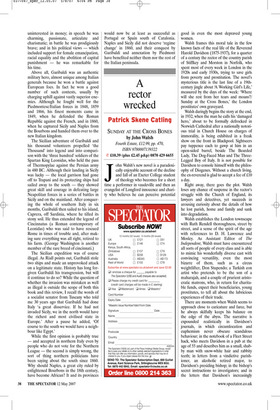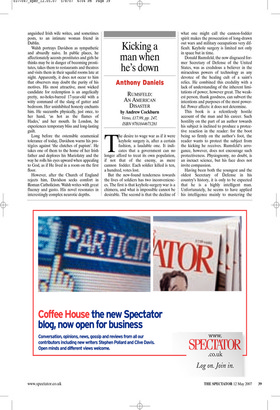A rector wrecked
Patrick Skene Catling
SUNDAY AT THE CROSS BONES by John Walsh Fourth Estate, £12.99, pp. 470, ISBN 9780007139322 V £10.39 (plus £2.45 p&p) 0870 429 6655 John Walsh’s new novel is a paradoxically enjoyable account of the decline and fall of an Exeter College student of theology who becomes for a short time a performer in vaudeville and then an evangelist of Longford innocence and charity who believes he can perceive potential good in even the most depraved young women.
Walsh frames this moral tale in the few known facts of the real life of the Reverend Harold Davidson (1875-1937), for a quarter of a century the rector of the country parish of Stiffkey and Morston in Norfolk, who spent most of every week in London in the 1920s and early 1930s, trying to save girls from poverty and prostitution. The novel’s mysterious title is the last line of a 19thcentury jingle about ‘A Working Girl’s Life,’ measured by the days of the week: ‘Where will she rest from her tears and moans?/ Sunday at the Cross Bones,’ the London prostitutes’ own graveyard.
Walsh daringly begins the story at the end, in 1932, when the man he calls his ‘damaged hero,’ about to be formally defrocked in Norwich Cathedral after a nationally notorious trial in Church House on charges of immorality, is being exhibited in a freak show on the front in Blackpool. Sightseers pay tuppence each to gawp at him in an open-sided barrel, beside The Bearded Lady, The Dog-Faced Man and The ThreeLegged Boy of Italy. It is not possible for Davidson to console himself with the philosophy of Diogenes. Without a church living, the ex-reverend is glad to accept a fee of £10 a day.
Right away, there goes the plot. Walsh loses any chance of suspense in the rector’s struggle with the Church of England, its lawyers and detectives, yet succeeds in arousing curiosity about the details of how he lost parish, home and family and sank into degradation.
Walsh establishes the London townscape with Ruth Rendell thoroughness, street by street, and a sense of the spirit of the age with references to D. H. Lawrence and Mosley. As Assistant Editor of The Independent, Walsh must have encountered all sorts of people of every class and is able to mimic his wonderfully diverse cast with convincing versatility, even the most bizarre of them, such as a circus weightlifter, Don Stupendo; a Turkish con artist who pretends to be the son of a maharajah, and a couple of prurient aristocratic matrons, who, in return for charitable funds, expect their beneficiaries, young prostitutes, to tell all about the lubricious experiences of their trade.
There are moments when Walsh seems to approach close to caricature and farce, but he always skilfully keeps his balance on the edge of the abyss. The narrative is expounded realistically in Davidson’s journals, in which circumlocution and euphemism never obscure scandalous behaviour; in the notebook of a Fleet Street hack, who meets Davidson in a pub at the age of 55 and describes him as a small, shabby man with snow-white hair and rabbity teeth; in letters from a vindictive parishioner, an alcoholic retired major, to Davidson’s presiding bishop; in the bishop’s secret instructions to investigators; and in the letters that Davidson’s increasingly anguished Irish wife writes, and sometimes posts, to an intimate woman friend in Dublin.
Walsh portrays Davidson as sympathetic and absurdly naive. In public places, he affectionately accosts prostitutes and girls he thinks may be in danger of becoming prostitutes, takes them to restaurants and theatres and visits them in their squalid rooms late at night. Apparently, it does not occur to him that observers may doubt the purity of his motives. His most attractive, most wicked candidate for redemption is an angelically pretty, no-holes-barred 17-year-old with a witty command of the slang of gutter and bedroom. Her uninhibited honesty enchants him. He succumbs physically, just once, to her hand, ‘as hot as the flames of Hades,’ and her mouth. In London, he experiences temporary bliss and long-lasting guilt.
Long before the ostensible ecumenical tolerance of today, Davidson warns his protégées against ‘the clutches of papism’. He takes one of them to the home of her Irish father and deplores his Mariolatry and the way he rolls his eyes upward when appealing to God, as if He lived in a room on the first floor.
However, after the Church of England rejects him, Davidson seeks comfort in Roman Catholicism. Walsh writes with great fluency and gusto. His novel resonates in interestingly complex neurotic depths.











































































 Previous page
Previous page